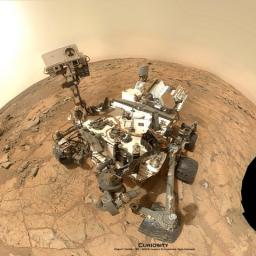Mysterious Mars Methane: Curiosity Sees No Sign
 In the past decade, probes orbiting Mars and telescopes on Earth have detected what appeared to be plumes of methane gas from the Red Planet. The presence of colorless, odorless, flammable methane on Mars, the simplest organic molecule, helped revive the possibility of life once existing, or even currently living, just below the planet's surface. Scientists have suspected that methane stays stable in the Martian atmosphere for only about 300 years, so whatever is generating this gas did so recently.
In the past decade, probes orbiting Mars and telescopes on Earth have detected what appeared to be plumes of methane gas from the Red Planet. The presence of colorless, odorless, flammable methane on Mars, the simplest organic molecule, helped revive the possibility of life once existing, or even currently living, just below the planet's surface. Scientists have suspected that methane stays stable in the Martian atmosphere for only about 300 years, so whatever is generating this gas did so recently. A large-scale non-biological source of methane production on Mars might have been an even more exciting result. A renewable process humans might be able to adapt for use on Earth to meet our energy needs. But Curiosity has revealed no trace of methane on the Martian surface.
"Based on earlier observations, we were expecting to land on Mars and measure background levels of methane of at least several parts per billion, but saw nothing," Webster told Space.com.
"It's a mystery surrounded by an enigma here," said imaging physicist Jan-Peter Muller.
http://www.nbcnews.com/science/space/mars-mystery-deepens-curiosity-finds-no-sign-methane-f4B11202946
http://news.nationalgeographic.com/news/2009/06/090610-pigs-video-ap.html
My question with cows is: What percentage of their methane emissions comes from decomposition of the solid waste? If significant portions of it is directly belched or farted into the air, it's going to be quite impractical to capture. Methane is lighter than air, so completely enclosing them inside a very tight-envelope building would work, but it would be extremely expensive to do.